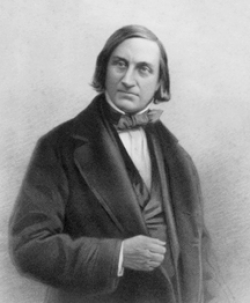Edward Forbes

- Born
- 12 February 1815
- Died
- 18 November 1854 (age 39)
Edward Forbes devoted much of his life to the study of molluscs and starfish and he was a pioneer in biogeography.
Forbes was born in Douglas on the Isle of Man in 1815 and collected mussels, fossils and plants from a young age. Geology and the conservation of sea life were new subjects when Forbes became interested in them.
Forbes started his career by studying medicine at Edinburgh, but on a botanical tour to Norway he became drawn to natural science. In 1834 he took a trip in a dredging boat off the coast of the Isle of Man and became a marine biologist, increasing our knowledge of the creatures found on the sea floor. He published the History of British Starfishes in 1841 and the History of British Mollusca in 1852.
Forbes focused on the littoral zone (the part of the ocean that stretches from the shore to the continental shelf) and as a result of this became interested in the distribution of animals. His 1846 essay, On the Connexion Between the Distribution of the Existing Flora and Fauna of the British Isles, and the Geological Changes Which Have Affected Their Area, divided plants found in Britain into five groups. He said that most of them had migrated to Britain (just like many animals) either before, during or after the glacial epoch. He concluded that land bridges had linked Britain and the continent before and during the last Ice Age. This is an accepted fact today but was a revolutionary and controversial idea at the time.
Forbes took up a number of posts, including Curator at the Museum of the Geological Society, Professor of Botany at Kings College, London and he was also a palaeontologist to the British Geological Survey. He became the youngest President of the Geological Society in 1853.
Forbes supported the young naturalist Thomas Huxley who had travelled to Australia. Huxley sent information about his discoveries to Forbes, who arranged for them to be published. This helped Huxley get elected to the Royal Society when he was just 25 years old.



